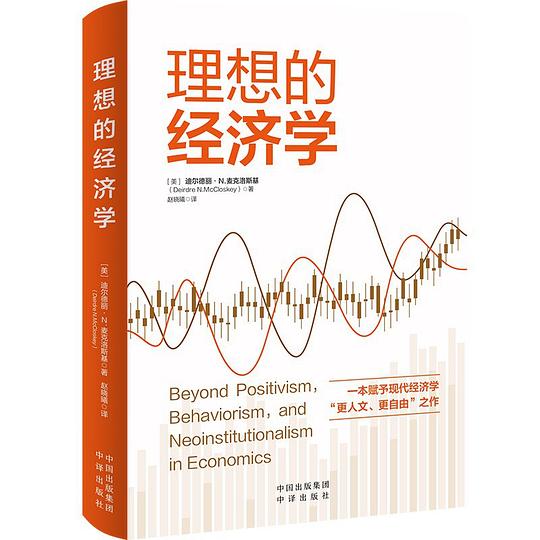
人文自由的经济学:理想的经济学
书名:理想的经济学
1
0

小懒猪 2023-06-14 10:31:23
These past few days, I read the book "The Ideal of Economics." This book can be considered a methodological approach to criticizing and reshaping economic thought and is part of an ongoing conversation in the field of "humanistic economics."
Firstly, lets take a look at the author of "The Ideal of Economics." Deirdre N. McCloskey is a world-renowned economist and economic historian who is often described as a contemporary "encyclopedic" economist.
Secondly, lets see what "The Ideal of Economics" mainly talks about. The book, written by Deirdre N. McCloskey, discusses the current scientific dilemma of economics and how it can be saved through the methods of humanistic economics. The book is divided into three parts; the first part introduces the economic dilemma, the second part explores the difficult situation of neoliberalism, and the third part proposes the idea that humanistic economics can rescue science through specific plans.
This book is a work that gives modern economics a "more humane and more liberal" perspective. The author, Deirdre N. McCloskey, believes that the ideal of economics should not only include basic economic theories, experiments, and mathematics issues but also consider relevant economic knowledge in history, philosophy, literature, and all anthropology.
In the first part of the book, McCloskey first introduces the wide application of economics and its scientific importance. However, as economics continues to develop, it faces more and more problems related to its complexity and uncertainty. She points out that the research of economics should be established on rigorous scientific methods and data support. Still, current economic methods are often limited by insufficient data and imperfect theoretical models. Therefore, economics is in scientific dilemma and faces unsolvable problems, such as how to take seriously the "imperfection" problem of unmeasured economics.
In the second part, McCloskey introduces the concept and theory of neoliberalism. She believes that economics needs a more institutional approach and framework to solve the deficiencies and inadequacies of current economic methods. Neoliberalism argues that economics should be a social and political science, not just a pure theoretical science, emphasizing the practical application and democratic values of economics. It proposes a new institutional framework to better support economic research and application. However, neoliberalism is not a victory for science.
In the third part, McCloskey proposes the idea that humanistic economics can rescue science, arguing that economic research should be based on more humanities and social science foundations to better support scientific methods and data support. She proposes specific plans, such as establishing more democratic and transparent research methods, strengthening the correlation between economics and social and political data, and establishing more effective regulatory mechanisms. These plans will help improve the research methods of economics, thereby better supporting the development of science.
Overall, "The Ideal of Economics" is a book worth reading that deeply explores the current scientific dilemma of economics and offers specific solutions to provide new ideas and directions for the research and application of economics.
相关推荐
萤火谷的梦想家
艾莉森•麦吉出生于1960年,是美国《纽约时报》畅销书作家,同时也是大都会州立大学创意写作课的教授。她的作品被翻译成20多种语言并出版,也曾被提名普利策奖,并获得苏斯博士奖金奖、克里斯托弗图书奖、美国 [美]艾莉森•麦吉/[美]克里斯托弗•丹尼斯/绘 2023-03-27 16:50:25鬼马女神捕1·绝密卧底(上)
腹黑凤凰vs毒舌鸡妖——蓝翎:“小姬,跟我去人界吧!”姬十四:“干吗?让人宰了我做小鸡炖蘑菇吗?”蓝翎:“不啊,让妖怪宰了你做小鸡炖蘑菇更气派。”凤凰蓝翎和鸡妖姬十四生活在无忧无虑的灵界。他们的故乡叫 郝天晓 2023-04-17 00:22:47© 2023-2025 百科书库. All Rights Reserved.












发表评价